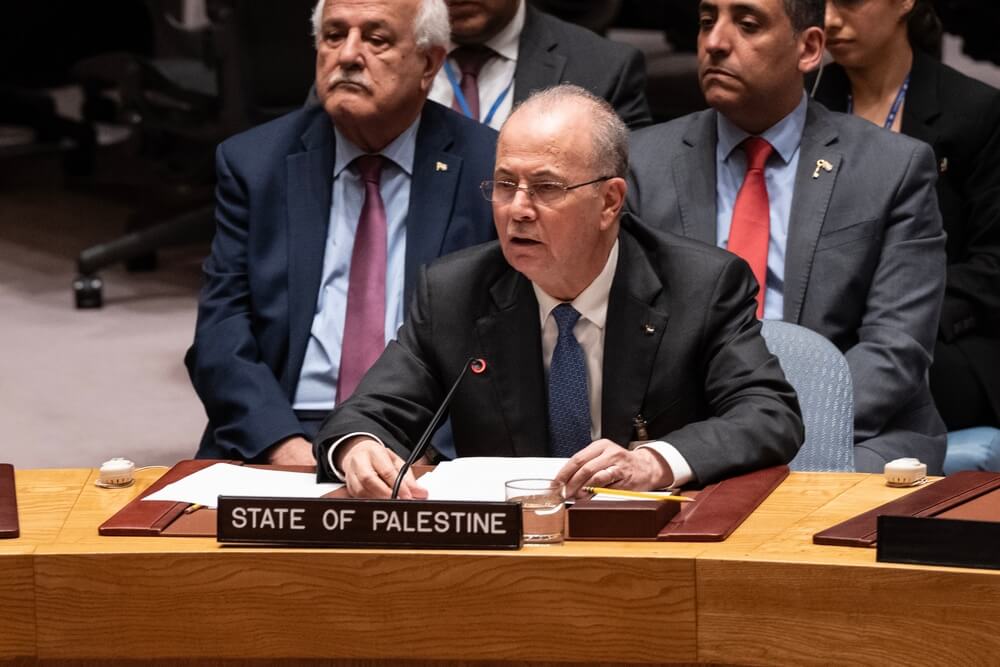Mounting outrage at Israel’s actions in Gaza and the West Bank has pushed the UK and France to discuss accelerating their formal recognition of a Palestinian state.
The issue is certain to be raised at a UN-backed international conference on Palestine in New York next month.
The impetus for the current debate is that Israel’s scorched-earth strategy in Gaza, coupled with the accelerating expansion of its settlements in the West Bank, risks destroying any prospect of the eventual establishment of an independent Palestinian state.
France’s President Emmanuel Macron revealed in April that the New York conference might be the occasion for France to join the overwhelming majority of UN members that already recognise a Palestinian state.
The UK foreign secretary, David Lammy, has since confirmed that British officials have discussed the recognition question with French and Saudi counterparts ahead of the June meeting, which will be jointly chaired by Saudi Arabia and France.
Britain and France are long-standing supporters of a two-state solution to the Israeli-Palestinian conflict. However, they have previously withheld formal recognition of Palestinian statehood until such time as the process towards a peace agreement was actually under way.
A collective effort
Despite the latest indications that they might be ready to revise that stance, the current odds are that, in the short term, they will not.
The British government is cautious about taking a merely symbolic step that might not have any practical consequences. France, meanwhile, appeared to link any policy change to a recognition of Israel by Arab states such as Saudi Arabia.
In the same interview with France 5 television, in which Macron raised the prospect of recognising Palestine, he said he sought a collective effort that would “also enable those who defend Palestine to recognise Israel in their turn, something that many of them are not doing”.
If the UK and France eventually baulk at shifting their current position on Palestine, will they have missed an opportunity to influence the course of events in the Middle East?
If the UK and France eventually baulk at shifting their current position on Palestine, will they have missed an opportunity to influence the course of events in the Middle East?
Or would they simply be acknowledging that diplomatic gestures alone have little prospect of influencing an Israeli government adamantly opposed to any version of a Palestinian state?
A gesture of solidarity
Currently, 147 of 193 UN member states recognise the state of Palestine, which has been a non-member observer state of the UN General Assembly since 2012. Spain, Ireland and Norway joined their number last year.
Those who argue for the UK and France to follow suit believe the addition of the two permanent Security Council members would add diplomatic weight to the international demands on Israel to resume a path to peace.
It would also be seen as a gesture of solidarity with the beleaguered Palestinian Authority, trapped between the violent politics of Hamas and widening Israeli incursions into the West Bank.
The UK’s Lammy hosted the PA prime minister, Mohammad Mustafa, in London at the end of April to sign a memorandum on enhancing bilateral relations. The foreign secretary used the occasion to reaffirm Britain’s unwavering commitment to a two-state solution as the only pathway to achieving just and lasting peace in the Middle East.
David Lammy played down the prospect of the UK changing its position on recognising Palestine
At a subsequent appearance before the House of Lords international relations committee, Lammy played down the prospect of the UK changing its position on recognising Palestine, saying such moves by other states had failed to change the situation on the ground.
He nevertheless stepped up his criticism of Israel, describing its blockade on aid reaching Gaza as horrendous and the suffering there as dire. The growth of illegal settlements in the West Bank, he said, was undermining the prospects for peace.
Hamish Falconer, the foreign office minister responsible for the Middle East, meanwhile signalled there would be no change in current policy. Echoing Labour’s 2024 manifesto, he told parliament: “We do wish to recognise a Palestinian state, and we wish to do so as a contribution to a two-state solution.”
He told questioners from across the House of Commons, however, that recognition must be part of practical steps to bring the violence to an end and pursue a peaceful resolution.
Both ministers were speaking before Israel began calling up reserves for an expanded Gaza offensive that will involve the further displacement of Palestinian civilians and which some officials said would lead to Israel seizing the whole territory.
A Starmer-Macron compromise
In the UK, pressure to move forward, on recognition of Palestinian statehood is apparent across the party political divide. The reluctance of Keir Starmer’s government to act now may reflect concerns about reigniting internal differences on Israel-Palestine that have split his Labour Party in the past.
 A Starmer-Macron compromise might involve postponing recognition of Palestine for now - PA prime minister Mohammad Mustafa
A Starmer-Macron compromise might involve postponing recognition of Palestine for now - PA prime minister Mohammad Mustafa
He may also be worried about highlighting another potential rift with Washington ahead of a visit Donald Trump is due to make to Saudi Arabia and the Gulf.
At the same time, the UK would ideally prefer to align its foreign policy with France, as it seeks to reinforce defence and security ties with Europe in the Trump era. Macron, in turn, might choose to delay a decision that would put it out of step with its UK ally.
A Starmer-Macron compromise might involve postponing recognition of Palestine for now, while agreeing to further refine the conditions and objectives that such recognition would involve.
The worst outcome would be for London and Paris to take opposing positions on recognition. That would be to throw away the potential benefits of a joint Anglo-French stance on salvaging any remaining hope of establishing peace on the basis of two sovereign states in Israel-Palestine.